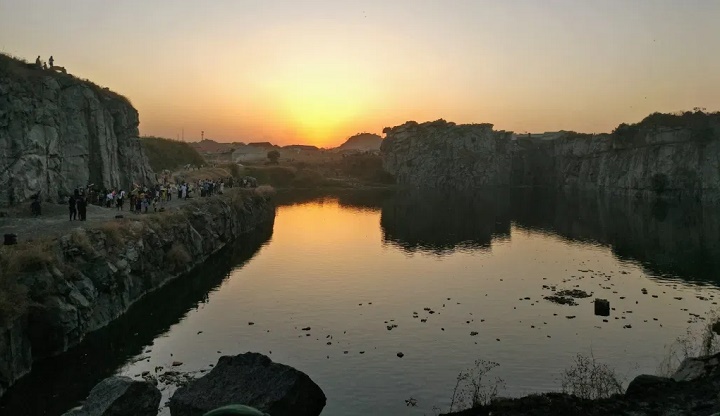BY BOLAJI ALONGE
Mpape Crushed Rock is an abandoned quarry in a less developed suburb of Abuja, the Federal Capital Territory of Nigeria. Abuja aims to be the face of the “new Nigeria”, with wide and well-maintained roads, luscious gardens and huge mansions, government buildings, impressive cathedrals and mosques.
It has grown exponentially over the last decade and wild construction remains in full swing, even throughout this COVID year.
While the centre area is home to the administration and its top officials, the city is encircled by hives of human activity, much less organized and more similar to rural neighbouring states. The workforce needed to push Abuja forward lives in very different conditions compared to their employers but is conveniently hidden.
The area around Mpape, which means “rock” in the local Gwari language, supplied much of the stone used to transform Abuja from a small village in the 1980s into the country’s capital city.

We got to know about the place through Abuja friends’ posts on social media and also read about the Crushed Rock in a BBC article published last August and had decided to check it out during our next visit to Abuja. The capital is not known for its busy cultural agenda and interesting attractions, so this natural beauty spot seemed like a perfect excursion with our friends.
To reach the Mpape Crushed Rock one needs to move through the bustling market of Mpape, overflowing onto the road. You can buy anything you might need on this market, from fish and fruit to belts and shoes, electrical appliances, clothes and bibles. There are no road signs, no indication on how to get to this novel tourist attraction. We zigged where we should have zagged, but after a few attempts and getting lost in translation in the process, we were on a very bumpy track to our destination.
Once we made our way out of the market, it became obvious that these roads would be more appropriate for a 4×4, or a sportive hike. After some spectacular tricks worthy of Starsky and Hutch, we made it to the entrance of the quarry, where we were greeted by a raucous group of young locals, the Abuja version of the infamous Area Boys in Lagos. They insisted we make a contribution towards the maintenance and cleaning of the area. Faced with no other option, we complied after negotiating a group tariff for our two cars filled to the brim with a couple of adults and several lanky teenagers. Another group of youths awaited us on the parking lot. After some more negotiations, we then proceeded towards our goal.




We were not disappointed. The Crushed Rock is truly a beautiful spot, it resembles a mountain lake or canyon. We walked down the shortest route to the waterfront, but we could see people all around the higher edges of the abandoned quarry. Towards sunset, the views became even more dramatic and a visual experience that is truly mesmerizing.
Nigerians are beginning to appreciate outdoor activities – the weather is hot in the north and quite humid in the south, keeping most indoors often. However, there is a burgeoning community of hikers around Abuja inspired by the many young Nigerian professionals and expatriates living in the city. The coronavirus pandemic has also played a part in encouraging these young middle-class Nigerians to explore the hills in the country’s rocky central region. The lockdown, which prevented people from travelling elsewhere, has meant that places closer to home are being explored. Staycation is the new order
Families, groups of teenagers, group of friends holding parties and even a DJ and his crew were all packed around the quarry. It has become a destination for Abuja residents and that has not gone unnoticed by local entrepreneurs who are eager to ensure one does not go thirsty. Water for the innocent, and beer or something stronger for others. At some point, I got a mirage of a massive rave around this lake with heavy beats bouncing off its walls.


During the #EndSARS protest the site was a popular meeting spot. Being ecologically conscious, the city boys and girls had started collecting waste and set up trashcans, only to be removed by the self-appointed ‘guards’. This exposes some of the challenges that a popular movement needs to address – bridging the gap between different social groups and bringing them together. The absence of local government and its apparent lack of interest in the development of the site could also be seen a glaring example of Nigeria’s governance deficiency.
Will the local area boys and hipsters come together and turn this into a success story for Mpape? We look forward to visiting again next time.
For a photographer from Lagos, it is sometimes difficult to find interesting shots in Abuja, until now.
Photos by Eyes of a Lagos boy
Copyright 2025 TheCable. All rights reserved. This material, and other digital content on this website, may not be reproduced, published, broadcast, rewritten or redistributed in whole or in part without prior express written permission from TheCable.
Follow us on twitter @Thecablestyle

